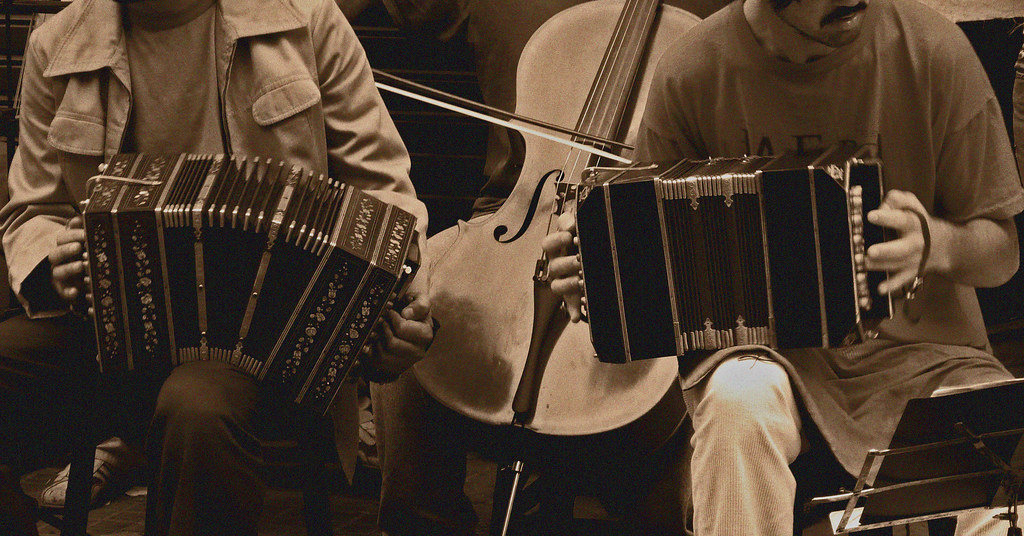
Photo by Alex
So now I've got tango music and DJ'ing on my brain again. I should do a photoshoot "This is your brain....This is your brain on Tango...". Remember the old public service announcement showing the egg and then the egg in a frying pan? "This is your brain...This is your brain on drugs...". Damn! I hate how I can digress from a post in just the second sentence.
This is actually a post I've been thinking of for a while. I'm surprised that I can still remember it. There are so many things about tango that we all assume everyone knows. On the subject of scratchy recordings, I've heard (and read things about) people saying they "don't like" the old scratchy tango music.
Granted, listening to a live tango orchestra in the Golden Age [roughly 1935 to 1945] was about as high fidelity as you could get. Recording technology in that day was "mono", not "stereo", which did not become prevalent in commercial recording until the 1960's. So, to start with, the original master recordings were not exactly "hi-fi". All of the musicians and the singer were facing a large "horn". All the highs and lows and mid-ranges and musical details laid down on one, single track. The discs pressed from the master showed an immediate decrease in fidelity and quality. The vinyl records got scratched and worn with use.
There were two primary recording companies working with the tango orchestras - Odeon and RCA/Victor. In the 1960's an RCA warehouse manager, in order to make more room for a new venture, destroyed most or all of their original master recordings. So today, many recordings (CD's) do not come from a master, but from vinyl records [many from private collectors], and from recordings of recordings, most of which result in scratches, pops, clicks and of course, lower fidelity.
Some of the current recording companies do their own, sometimes poor quality, "restoration". Some of the recordings have even been sped up, and/or the pitch changed. The resulting "restorations" can sound muddy or tinny. Some individuals are also doing high quality restoration. Keith Elshaw at totango.net is a restorer and authority on tango music and recording. There is a great wealth of information on his website. You should check it out.
Finally, I'll get to the gist/crux of this post. There is a reason some of the music sounds scratchy and old. That reason is part of the history and culture of tango. Yes, if all of the music played was like this, it could get on your nerves after a while. Some DJ's avoid the older/poorer recordings. I never have. I have always enjoyed dancing to the few/several old funky recordings that I have, so I play them at the milongas/practicas I have DJ'd.
When those start to play, I envision an old couple in Buenos Aires, at home, putting that old scratchy disc on the turntable, and dancing a few tangos together before bedtime, remembering the old days.
When a clearer, higher quality recording of an orchestral/romantic tango plays [like DiSarli's Verdemar] I envision myself dancing during the Golden Age, in a lavish, architecturally beautiful ballroom, to a live orchestra, with the particular beautiful woman I hold in my embrace. I transport myself, I transport the two of us, to that time, that song, that orchestra, that dance floor.
All of this makes me wonder. I wonder if some DJ's avoid some of the richer recordings, with more character. I wonder if this "conditions" dancers, conditions entire tango communities to more bland recordings. More bland versions by more bland orchestras. Sometimes I will hear a particular version of a song [by a certain orchestra] playing, and wonder, "why is he playing this version? it's the worst one!..."
I would much rather dance to a richer, more full-of-character, more romantic, "scratchy" tango/vals than some clean, bland, piece of shit.
And that, my friends, is an understatement.

2 comments:
Again, I'm with you, Alex. Far from being annoyed by the "scratchiness", I find that old-time quality very evocative and stirring.
Granted, if more than a few are played, I start worrying that it's my hearing that's going :-)
PS - love the photo!
Post a Comment